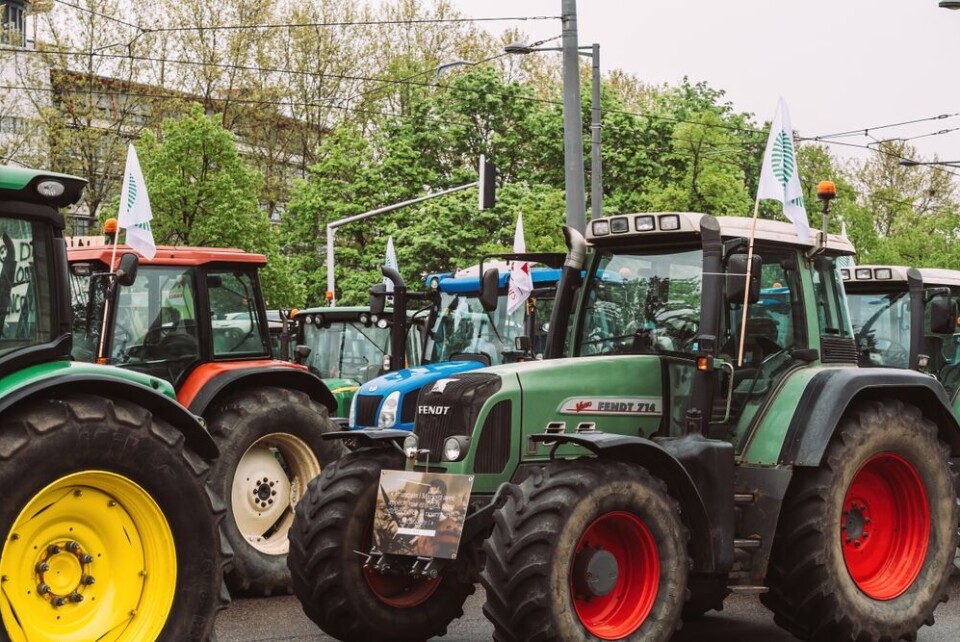-
Large increase in Americans buying properties on the Cote d’Azur
President Trump is cited as a major factor, but is not the only reason for the area’s popularity
-
What are the jobs you cannot do in France with ‘auto-entrepreneur’ status?
The status offers tax and administrative advantages, but has strict rules about the professions allowed
-
Yellow lights for pedestrians in many cities in France - what do they mean?
The lights are being trialled in six major cities until 2027
French farmer roadblocks continue: Woman killed as car hits barricade
The accident left two other people seriously injured as the protest spreads around the country

A woman was killed and her daughter and husband seriously injured after a car hit a roadblock in the south-west as the farmers’ protests against government regulations spread across the country.
Farmers have been barricading an increasing number of roads and motorways for the past four days. Negotiations have so far proved fruitless, and the death of a protestor is likely to spur further tensions.
The accident happened just after 8:00 on January 23 as a car attempted to force its way through a farmers’ roadblock near Pamiers (Ariège).
The woman was pronounced dead at the scene. Her 14-year-old daughter and husband were transported by helicopter to Toulouse.
Police arrested the driver and, although the crash is being treated as an accident, have passed the affair to the procurer in Foix to investigate on the grounds of ‘manslaughter and accidental injury’.
The procurer, Olivier Mouysset, initially stated that the daughter had also died, but has since clarified that both the girl and her father are alive albeit in critical condition.
Mr Mouysset has since revealed that the driver was an asylum seeker of Armenian origin under orders to leave France, announcing to a press conference that "even if he is freed on these charges, he will be put into administrative detention."
Read more: Farmers block several French motorways as protests spread
Which roads are currently affected by the farmers’ protest?
There are currently ongoing protests on the:
- A16 near Beauvais (Oise)
- A62 near Agen (Lot-et-Garonne)
- Nationale 21 near Bergerac (Dordogne)
- Nationale 20 near Pamiers (Ariège)
- Access roads to Poitiers (Vienne)
- Access roads to Niort (Deux-Sèvres)
- A63 near Bordeaux (Gironde)
- A64 near Carbonne (Haute-Garonne)
- A68 near Albi (Tarn)
- A7 near Saint-Rambert-d'Albon (Drôme)
- A61 between Toulouse and Narbonne (Haute-Garonne)
- A4 near Strasbourg (Bas-Rhin) - expected on January 24
More roadblocks and rolling blockades are expected in the coming days. The president of the FNSEA farmers’ union told RMCthat the rapid spread of the movement is proof that "this is not just a moment of frenzy, but a deep-seated feeling”.
“We are hearing more roadblocks being announced every minute,” he said.
What do farmers want?
Many demands relate to the growing weight of French and European regulations, however the tipping point for protestors is the new tax on agricultural diesel or gasoil non routier (GNR).
Agricultural diesel was previously subject to an exemption from a fuel tax called the Taxe intérieure de consommation sur les produits énergétiques (TICPE) at a rate of 18.82 €c/L instead of the standard rate 59.4 €c/L.
The tax was reintroduced on January 1, 2024, and is set to rise progressively until 2030. The objective of the tax is to decarbonise agriculture.
While the FNSEA union made a deal with the government in the summer of 2023 concerning the planned increases in the tax, many farmers still find themselves under increasing strain as it comes into effect.
How are French authorities managing the protests?
The reaction to the protest - and to the car accident - from the French authorities has so far been extremely restrained.
“There is no plan to clear the protesters,” Interior Minister Gérald Darmanin announced on January 22, even adding that he “would like to support them politically, while encouraging them to respect the common good.”
“But we will not send the CRS [riot police] against people who are suffering”.
Politicians from across the political spectrum have been keen to show their support for the protesters, with both Marine Le Pen (Rassemblement Nationale, far-right) and André Chassaigne (Communist Party) blaming the government for putting too much pressure on farmers.
Prime Minister Gabriel Attal met with Mr Rousseau in the evening of January 22.
However, the meeting was apparently fruitless, with Mr Rousseau announcing “no end to the present actions” without “concrete solutions”. The union boss conceded on RMC that Mr Attal “showed an understanding of the problems French farmers face”.
Read more
Will €3.5billion pledge be enough to secure future of French farming?
Why French village and town road signs are being turned upside down
























